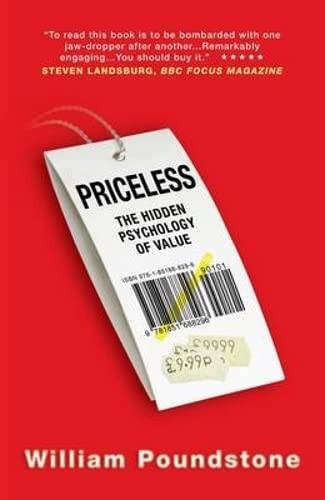Explore the World's Best Ideas
Join today and uncover 100+ curated journeys from 50+ topics. Unlock access to our mobile app with extensive features.
Value is subjective
People don’t judge prices in absolute terms but relative to their context. This book goes on to explain the many ways that our perceptions of value are not fixed.
2
39 reads
Attraction Effects: Professors at Duke University offered 2 beers at $1.80 & $2.60. 33% chose the cheaper product.
A 2nd group was also offered a $1.60 beer. 0% chose it, but 47% now chose the $1.80 beer. Products priced at extremes can change the demand for other products.
Extremeness Aversion: Research by Tversky & Simonson across 6 categories found that consumers tend to shy away from the most expensive & least expensive options. In conditions of uncertainty, most consumers will opt for something in the middle.
4
39 reads
Charm Pricing: Anderson (University of Chicago) & Simester (MIT) worked with a mail order firm to print different versions of its catalogue. They found an item sold 30% more when priced at $39 than $34. Buyers deem prices ending in a 9 as better value than those that don’t.
Loss Aversion: Losing money hurts more than gaining the same sum delights. Imagine betting on a coin toss. If it’s tails you lose $100. The average person requires heads to pay out £200 to take on the bet. Money we have is around twice as valuable as money we don’t have.
4
21 reads
Anchoring & Adjustment: Malouff & Schutte had groups read a personal injury case. When the defence lawyer requested $100k the “jurors” awarded $90,333. A group with a £700k demand awarded $421,538. The original prices acted as anchors from which the groups adjusted down.
Ultimatum Game: Imagine you’re given £10 & asked to offer a 2nd person a split. If they accept, you both get your share. If not, neither do. Research by Werner Güth found most recipients reject offers of £2 or less. We’re willing to forgo gains if we think they’re unfair.
2
19 reads
IDEAS CURATED BY
CURATOR'S NOTE
William Poundstone offers many examples of how our perceptions of prices vary depending on cues, context and contrast.
“
Claudiu Florea's ideas are part of this journey:
Learn more about books with this collection
How to make rational decisions
The role of biases in decision-making
The impact of social norms on decision-making
Related collections
Discover Key Ideas from Books on Similar Topics
Read & Learn
20x Faster
without
deepstash
with
deepstash
with
deepstash
Personalized microlearning
—
100+ Learning Journeys
—
Access to 200,000+ ideas
—
Access to the mobile app
—
Unlimited idea saving
—
—
Unlimited history
—
—
Unlimited listening to ideas
—
—
Downloading & offline access
—
—
Supercharge your mind with one idea per day
Enter your email and spend 1 minute every day to learn something new.
I agree to receive email updates
